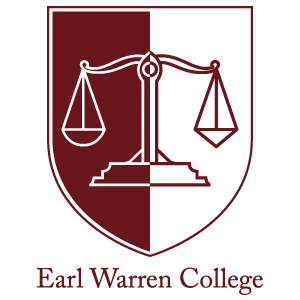Warren College Writing Course (WCWP 10A): Climate Change Ethics

The Warren College Writing Courses are among the first required classes for all incoming Warren freshmen. In Fall 2017, the Warren College partnered with Scripps Institution of Oceanography to turn one of these first-year writing classes into a course on Climate Ethics. Warren College Writing Program Director Dr. Jeff Gagnon, who developed and taught the new course, explains:
Warren College Writing Program Director Dr. Jeff Gagnon, who developed and taught the new course, explains:
“In Warren College we have two lower division, writing-intensive courses that all of our students are required to take, usually within their first two years here. Our curriculum theme focuses on justice and ethics because of our namesake, Earl Warren. So we came up with the idea to turn one of these courses into a class called Climate Change Ethics. This means that every single student in this college is learning about climate change at an introductory level.”
How is the class structured? What kind of material do you cover?
"We start with questions like, 'What do climate scientists say is happening and how are they communicating this?' So we look at what the climate science is saying, and we go back to when was the consensus first developing. We start with James Hansen’s testimony in 1988, and then the IPCC report in 1995, and so on. We talk about consensus: what is consensus, and what does that mean? The next question is, if there’s so much consensus and the consensus has been around for so long, why do more than 40% of Americans have doubt about the consensus? Why don’t they trust the climate science, and the scientists that have done this work? So from the perspective of a writing class, we raise the question, why don’t people trust what science is saying? We draw from the digital textbook Bending the Curve, Merchants of Doubt by Naomi Oreskes, and other resources that raise these sorts of questions."
"In the second half of the class, we introduce students to research on solutions. If we know what the causes and effects are, and we know there’s all this doubt, what kinds of solutions should we be talking about? We give the students an introduction to science-based solutions, renewables and things like that, and then we look at social justice arguments. What kinds of solutions do we need? Do we need more science, better science, more science supporters? Or do we need transformation of society in some way?"
"Then we move from learning about solutions to communicating about solutions. How do you communicate solutions to people effectively? We introduce them to the concept of addressing different target audiences, and one of their major projects in the class is to communicate a solution about climate change to a particular audience in a genre of their choosing: it could be print, could be digital, social media, etc. It’s a fun writing project to teach because it involves many different aspects of writing that are very relevant in the 21st century. It’s not all 5-to-6 page papers, 12 point font, 1 inch margins, with a works cited page. What about adding images? What about making a website? What if you’re trying to reach old high school students? What if you’re trying to reach engineers? What if you’re trying to reach your grandparents? You’re going to have to use different strategies."
How would you summarize the learning objectives for the course series?
From the writing side of things, I’d say we’re trying to teach students that all communication, and all written communication, requires an analysis and understanding of who your intended audience is, what the purpose for writing is, what the genre of writing is, and what strategies you should or could use to achieve that purpose for that audience. Which works when you’re trying to write a blog post or a history paper. We’re trying to teach the idea that that’s how you learn to write, and that’s how great writers work on their craft.
From the content side of things, we want students to develop a growing understanding into the causes and effects of climate change, and the solutions that are most needed to develop change on the issue. We keep it pretty broad, and we fit in the ethical questions too.
Anything else you’d like us to know?
I think that with the support of the college writing programs, there's the possibility to introduce a lot of students on an introductory level to things that could help us make some progress on the issue of climate change. It's a really exciting opportunity.
